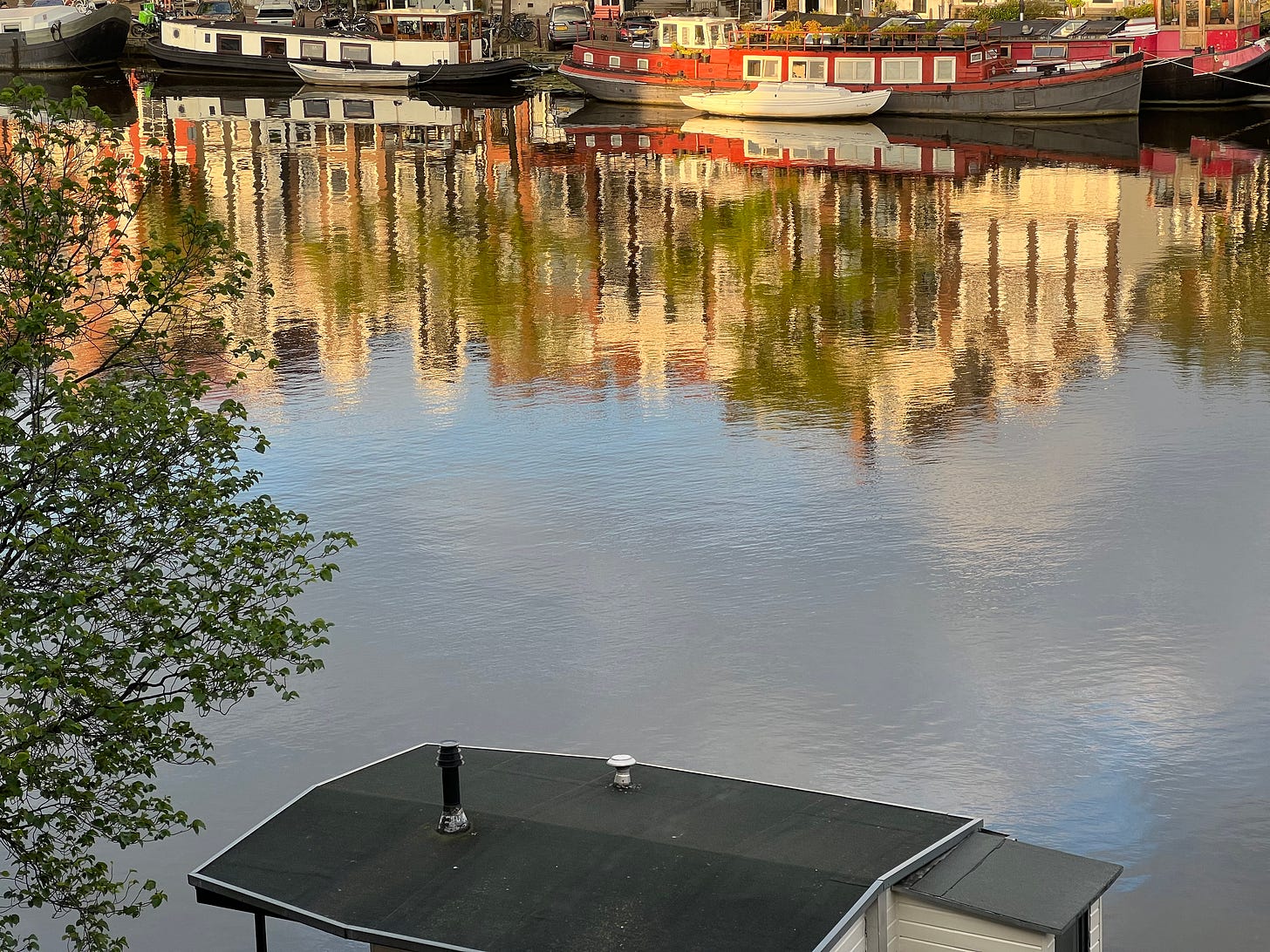A bit of a departure this week. Well, is it really? This newsletter is about narratives. Mostly about narratives in the brand world. But the reason it started in the first place was because of my own narrative, and that of my family’s.
You see, going through life in a bit of a zig zag is imbued in me. I’ve lived on two continents, in three countries, and eight cities. My career path hasn’t been preordained. I didn’t expect to ever work at Apple. And I didn’t set out to work at Red Bull. I started life as a journalist because I’m a generalist to my core. I like talking to people, and I like hearing and telling their stories. The fact that those things are relevant skills across a wide swath of industries was only apparent to me later in life.
So when I look back on the career so far, it’s been a story of narrative disruption - different roles and titles, different industries and categories. And in different geographies.
It’s why I’m most interested in the people that take unconventional paths (like Ian Rogers), and why I’m most interested in brands that do the same (like MSCHF, or PeopleCarePlanetCare). It’s why I don’t use this newsletter to comment on the latest ad campaign I’ve seen, or partake in knee-jerk discourse around what Jaguar is or isn’t on LinkedIn.
I’m not that interested.
I am interested in the philosophical idea of a brand, on the position it takes up, the real estate it seeks to claim in our minds and emotions. I’m interested in the stories it tells as a result of that position, and how consistently it does it, and how surprisingly as well. But brands are mostly about the people shaping them, who bring their own stories into their work. Stories that add to a brand’s evolution, or detract from it.
And stories are just the fucking best.
So here’s an update on mine.
Two years ago this week, I left a job at a very nice company that paid me very nice money to work with very interesting people to move with my family to Amsterdam. We did this because we wanted to show, not tell. We wanted to show our sons another way of being in life. We wanted them to experience the highs and lows of adapting to a new culture and language, and hope (secretly and not-so-secretly) that it would light in them a lifelong sense of adventure, and fearlessness in engaging with the many slivers of humanity.
And they have — in ways we can both see and not see. They learned Dutch in 4.5 months and built a circle of friends — thanks to the culture of relentless play dates in this country, and my wife Heidi’s evolution into the family’s Socializer-in-Chief. They can ride bikes properly (mostly), know what to do when they fall into a canal (the older two at least), and soon will no longer depend on us for pick ups and drop-offs, or even social appointments.
What we didn’t anticipate, is our own adjustment. Below, a couple of thoughts for those thinking of doing the same.
Move towards a place. Don’t run from a (less desirable) place.
It would be easy to look at our move in hindsight as a savvy decision to depart a country in which an Orange Stain now rules again as a thin-skinned coterie of Rich White Tech Men huddles in his bloated shadow, watching as he wreaks havoc at the expense of the very many, for the gain of the very few. But don’t do this. If you can help it (and not all can, but I can only speak from my own experience), move because you’re after something, not running away from something. This is a crucial mind game to play on yourself. Wherever you move to, its glow will fade, its charm will rust, and its grind will manifest. Overcoming this slight let down is easier when your intention all along was to expose yourself to this very adventure, in all its joy and complexity. We wanted to show our kids a different way of living and get them to learn another language. We loved the idea of Amsterdam and wanted to understand the layers of the city better, historically, culturally, and professionally. We also knew it was going to be difficult for them, and for us. And though they were only 3, 5, and 7 when we moved, we were very transparent with them. If you want to look at it in a brand way, we were consistent and coherent in our messaging across touchpoints. The pandemic helped. I went from leaving the house before my kids were properly awake and returning just before they went to bed, to being with them most of the day. We got closer as a family. They got along better with one another. We got along better with them. The time to take this leap felt right, and I knew the window would close the moment the family began setting down roots in the hometown. I’m convinced this is why our kids have — so far — adjusted well. We sold this in as a big adventure that was going to be fun, but was also going to challenge us. But that whatever challenges came, we would overcome them together.
You might move for a city, but you stay for a culture.
It’s not all bell-ringing bike trips in the summer sun, flowers spilling out of your front basket, and a bottle of rosé dangling in your Albert Heijn bag. The weather turns and with it the easy socializing and warm buzz. Your kids play a bit too loudly, or you park your boat in the wrong spot, and The Way of Things becomes apparent. These aren’t bad Things, mind you. The Dutch are direct, yes, but they use this directness in service of community as well. Amsterdam is a big town that feels global and cultured enough. But it’s made up of buurten with long-term residents who check you when you put the trash out on the wrong night, or your kids’ legs dangle too close to the spokes of your bike as they ride on the back. It’s a culture that looks for the best deal, sees food as fuel (not something to be constantly improved upon, or reimagined) and doesn’t traffic in the (often) performative warmth of my home state of California. This means you will miss some of these things. Things, like high quality delivered pizza, which is a Goddamn National Nightmare here. But you can sign up for the expat experience, grumble and exist in your bubble, or you can throw yourself into it and speak like a 6-year-old Dutch boy when asking for something at the hardware store, knowing full well the other person is fluent in your native language but goddammit soldier on because what’s the point of all of this otherwise? These feelings? They’re the first inklings of what sociologists called “integration”. And they’re awkward, and demand you question some things, but ultimately they enable you to start peeling back the layers of a place. And in those layers, children, is the very grist of human connection and understanding.
You’re probably amazing at one thing, not many different things.
Working at a big company is about tradeoffs. One of the big ones is slowly subsuming who you were and what you specialized in into the service of the big company’s needs at the moment you’re working there. This is important to know because when you leave, you will most likely drift for a bit. I spent six months trying to articulate who I was and what service I thought I could provide as an independent brand consultant. The market has spent the last year letting me know in which ways I was right, and in which ways I was wrong. This is ongoing. But what’s shocking is how the work that mosts suits you, finds you. We want to believe that we’re really amazing at many things. Especially us generalists. But the reality is that you’re probably really amazing at one thing, and the trick is using that one thing to crowbar your way into the work you’re not yet good at but want to get better at, or at least learn about. An example: I’ve made short films, series, podcasts, and written articles all of my adult life and professional career. Most people, though, think of me as a writer. I chafed against this characterization. Now, I’m learning to embrace it. Writing, for me, is about defining and articulating ideas, concepts, and strategies. I do this for people. I do this for brands. My ability to write has resulted in an upcoming book with a brand I love and admire, and — with my clients — has given me a front seat in learning how to position brand decisions that can influence business objectives. This is the work I do now. And I’m getting better at it because I was honest with myself.
Your foreign-ness is useful. Use it.
The type of person who ups stakes and leaves the known for the unknown is likely the type of person who can strike up a conversation with a stranger, or follow up a connection with an offer to meet without overthinking it. This skill’s value is amplified in a place where you’re different because of where you come from. My background working at the big tech company in another country opened up doors for me, yes, but my experience living in different places enabled me to walk through and connect with the people on the other side. God I wish I could think of a relevant parable here, or a story from Irish folklore or something, but the point is that humans are generally curious individuals, and when you alight from another continent, with skills and experience both similar and other, people want to meet you. This is the best way to crowbar your way into rooms where you might not yet belong, by the way. This is something you need to use. And you need to be relentless about it at the outset, because it dims the longer you’re in a place.






A culture of "relentless play dates" has me laughing. Love your insights here Andreas, very inspiring.
So much goodness in this post! It's like I'm reading a breakdown of what's really going on in my head as I contemplate a physical move of my own. Thanks for sharing, bud!